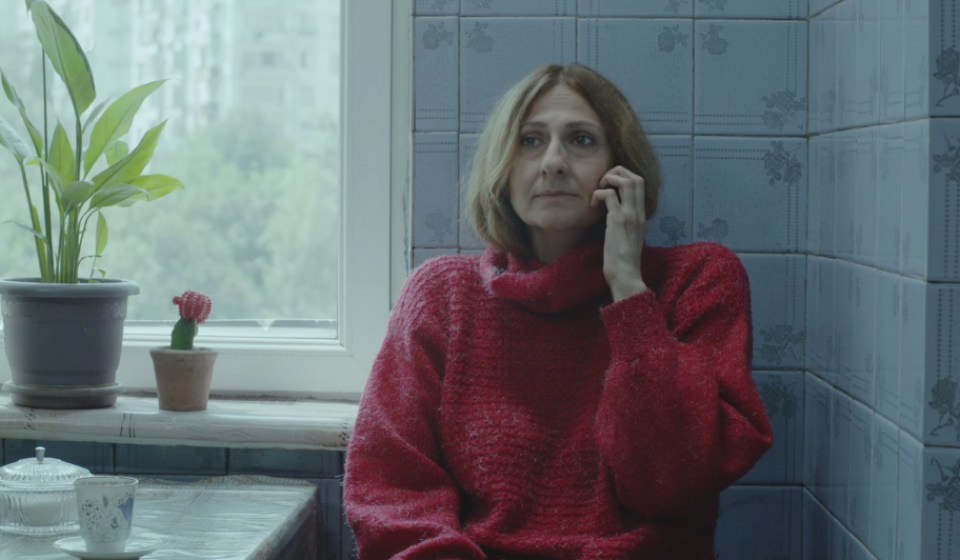Review: 12K. Marx Street (2019)
Uppsala Short Film Festival
International Competition

A Georgian woman calls the same number day by day from her kitchen, but nobody answers. Although those phonecalls have become her routine, it seems like she doesn’t care if someone will eventually pick up. Her face is expressionless, her body language relaxed. Between the attempts, she deals with small kitchen chores. We see her brewing thick, strong coffee in the traditional way and observe her while she is cleaning her daughter’s ice skates.
The face of Tika Laghidze is the only one we are getting to see during the whole film, and the way the story was plotted doesn’t require additional characters to appear in person. There are voices in the background just to indicate that the woman is married with a child, and nothing else penetrates the tiny kitchen besides external sounds.
Painting the loss of past, the pain it brings and the need to find out what became of the places one knew but was robbed of is onerous. The presence is always physical, it can be painted, filmed or descibed in many words. But when it comes to absence it takes a hell of a talent to give it a shape in an actual script.
In Irina Jordania’s directorial debut 12K. Marx Street the change in dynamics happens when the call is eventually answered. The voice coming from the other side is foreign. It comes from an intruder who speaks Russian and who happens to be the occupant of her family house that brings many memories. He begs her not to hang up. And while he’s describing what he found in and around the house, the woman goes back to her childhood. This is where the photography of two cinematographers Tato Kotetishvili and Gigi Samsonadze does its magic. Memories are set in distorted images that we recognize as pieces of past coming random to our mind. A meadow bathing in purple flowers swaying in the wind, a metal swing and a walk through the woods, with images distorted and slowed down, are like excerpts from a person’s brain being taken out by a wicked software.
The woman doesn’t speak, she’s only listening to words avalanching from the man’s mouth, now alert and visibly shaken. Only then the realization comes that she needed the spoken confirmation of the unspoken terror. At the same time, another wonder happens: the confession of a man who was pushed into something he never could accept in his soul. The connection is made.
The film is dedicated to every 8th Georgian who has been forcibly displaced from their home during many, many conflicts in the country’s recent history.
Big praise goes to the production designers and Temo Ezugbaia’s visual effects, as well to the artistry of the costume designer Tinatin Kvinikadze who turned every single phonecall attempt into a work of art by dressing Tika Laghidze in the best home-real attire.
Irina Jordania’s directorial debut 12K. Marx Street was selected as PÖFF candidate for the European Film Awards 2020.
Original Title: მარქსის ქუჩა 12
Country: Georgia
Language: Russian
Year: 2019
Runtime: 15’30”
Production: Studio Kedari, Millimeter Film
Written/ directed by: Irina Jordania
Produced by: Irina Jordania, Suliko Tsulukidze, Tamar Tvaradze,Dato Ujmajuridze
Cinematographer(s): Tato Kotetishvili, Gigi Samsonadze
Production Design: Thea Telia, Nino Koridze
Costume Designer: Tinatin Kvinikadze
Makeup Artist: Salome Zakaraia
Sound Design/ Mix: Paata Godziashvili
Editing: Levan Butkhuzi
Visual Effects: Temo Ezugbaia
Cast: Tika Laghidze, Dato Ujmajuridze
Supported by Georgian National Film Center
















